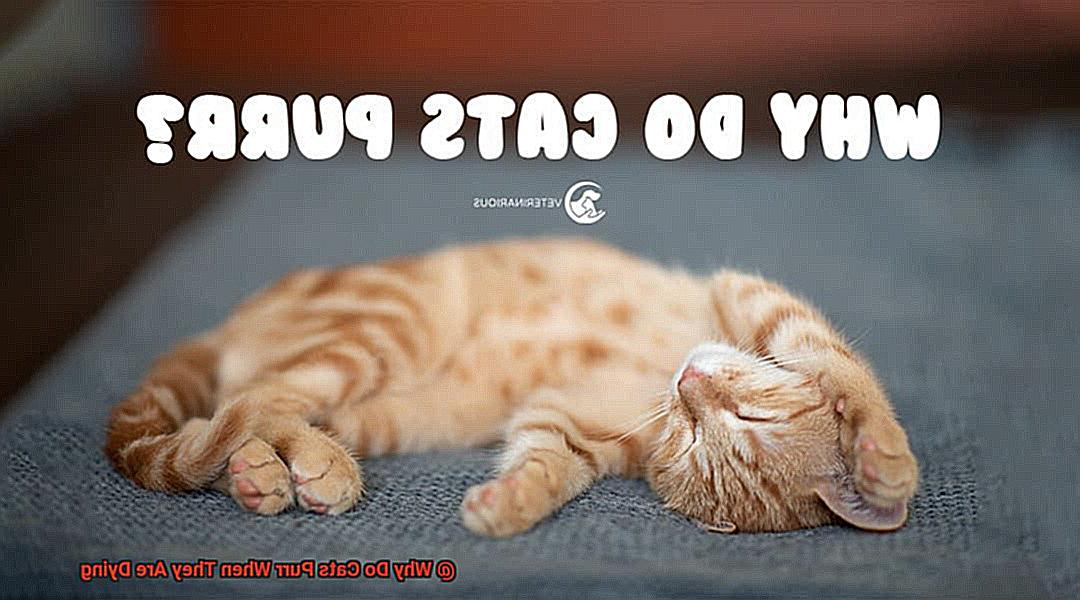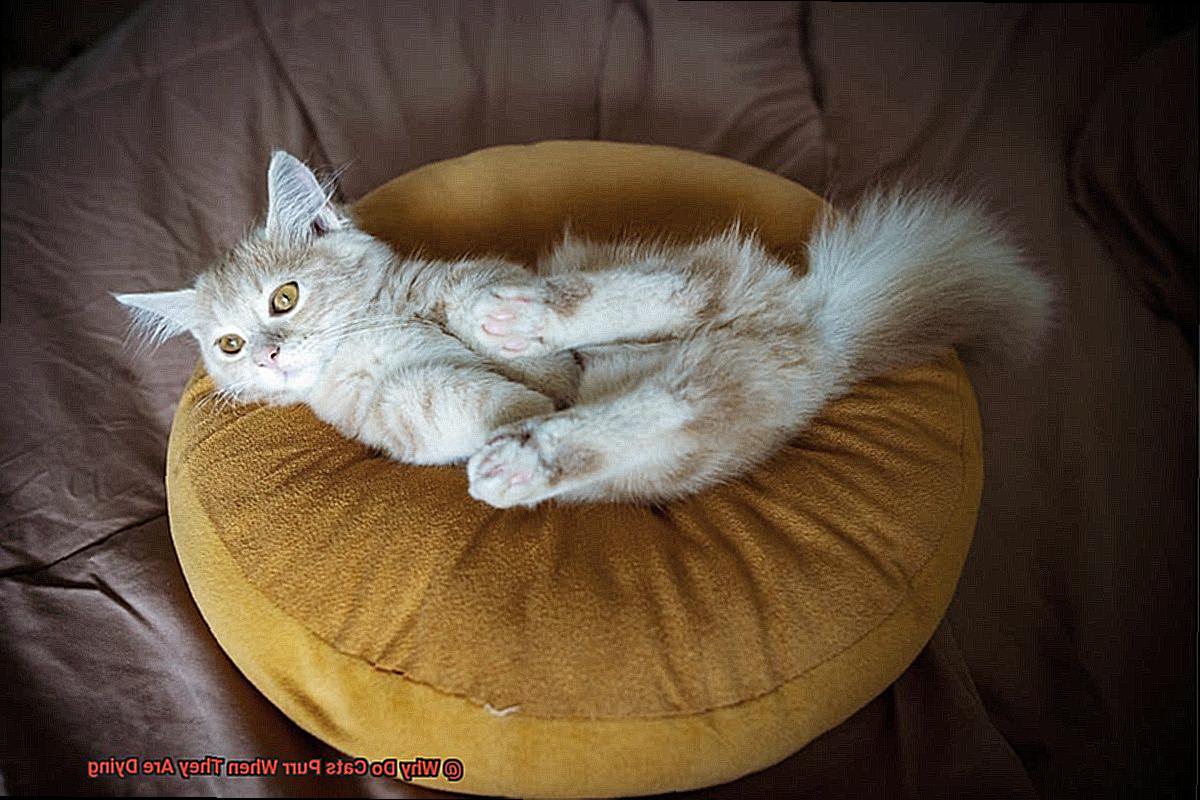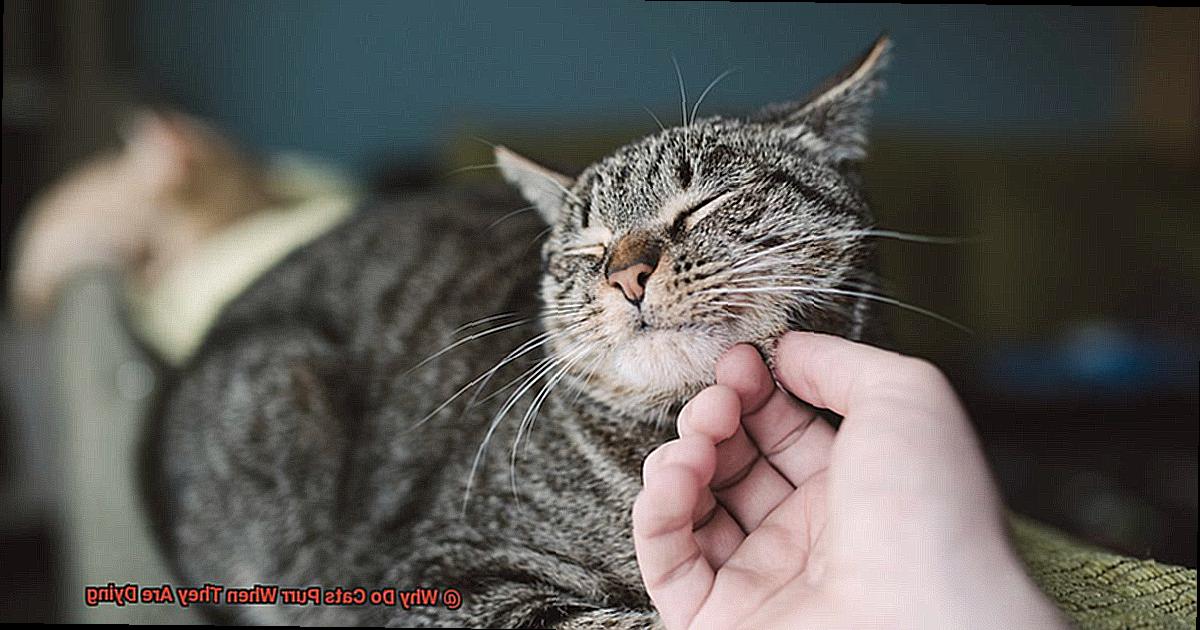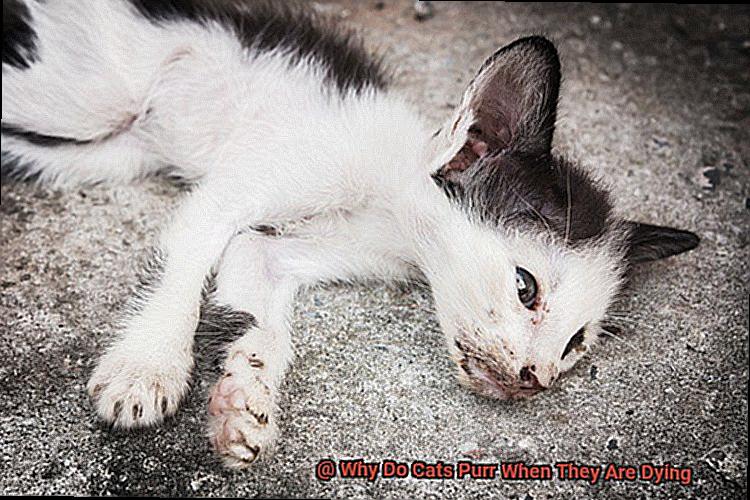Have you ever heard your cat purr in its last moments? Many pet owners have. But why do cats purr when they’re dying?
This is a question that has puzzled many people for years. It turns out, there’s a powerful bond between cats and their owners – even at the end of their lives. Cats are adaptable creatures, and they can find solace in the presence of their loved ones in their final moments.
When a cat is nearing death, it often starts to purr as a way of saying goodbye. This behaviour is thought to be an instinctive reaction that helps them cope with the fear and agony of death. Endorphins released by purring can provide some relief and help them relax as they pass away.

Purring can also help cats conserve energy during this vulnerable time. As their body fades, they need all the energy they can get to make the transition easier. Purring doesn’t require less energy than meowing or other vocalizations, so cats will often use this method instead if they feel lonely or ill.
During this difficult time, purring can also act as an emotional connection between cats and their owners. It’s a way for them to let us know that we are still important even though they are unable to express themselves verbally anymore – a beautiful reminder of how much our furry friends love us even in death.
So why do cats purr when they die? It’s likely due to several reasons: as both a source of comfort and solace for those around them, as well as an expression of love that transcends any physical boundaries between them and us.

What is Purring?
Purring is one of the most recognizable and beloved sounds of cats. It is usually associated with contentment and relaxation, but cats can also purr when they are scared, hungry, or even dying.
So, what exactly is purring? It is a form of vocal communication used by cats to express a range of emotions. This sound is created by vibrating their vocal cords with their diaphragm muscles, producing a noise that can range from a soft rumble to a louder, deeper sound depending on the size and age of the cat. Kittens tend to have higher-pitched purrs than adult cats.
Cats begin to purr shortly after birth and will continue to do so throughout their lives as a way to communicate with their mother, siblings or other cats. They also purr when they are happy and content or when their owners give them attention and affection. Interestingly, cats will also purr when in pain or distress, indicating that the sound is not always an indication of happiness.
Some studies suggest that purring has healing properties and can help cats self-heal by reducing stress, lowering blood pressure, and speeding up bone tissue repair. Furthermore, it can act as a form of self-soothing for cats in pain or distress. By understanding why your cat is purring you can respond quickly and ensure its well-being.

Why Do Cats Purr When They Are Dying?
The sound of a cat’s purr is often seen as a symbol of contentment and joy, but cats may also purr when they are dying. This can be an emotional and confusing experience for cat owners, so it’s important to understand why cats do this.
When cats are nearing the end of their lives, they may start to purr as a way to cope with pain or distress. The vibrations from purring can help relax their muscles and release endorphins, which are natural painkillers. In addition, cats may also purr to communicate with their owners in their final moments
it can be a sign of love, gratitude and comfort for both the cat and their human companion.
It’s important to note that not all cats will purr when they die, so it’s important to watch out for other signs of distress or pain in your cat. However, if your cat starts to purr when they are near death, it is likely that they are trying to cope with the situation in the best way they can.
Self-Soothing Theory
It may be a heartbreaking and emotional experience, but there is likely a reason behind it.
Self-soothing theory suggests that cats purr when they die to help them cope with the stressful and painful situation. This is because the vibration of purring can assist in reducing a cat’s heart rate and blood pressure, creating a sense of relaxation and comfort. Additionally, research has shown that the frequency of purring has healing properties, which may explain why cats purr when they are sick or injured.
Cats may also use their purrs to communicate their emotional state to their humans. As they approach the end of their lives, cats may seek out their owners and express their affection through purring. This can be an incredibly powerful moment for both pet and owner, one that should be cherished.
Ultimately, although not all cats will purr when they die, it is important to remember that this behaviour is normal for them.
Communication Theory
The comforting sound of the purr can be both soothing and heartbreaking.
But why do cats purr when they are dying? According to communication theory, purring is a form of non-verbal communication that cats use to express their emotional states.
It is believed that cats may purr to self-soothe and reduce pain; the vibrations from the purr may lead to the release of endorphins, which act as natural painkillers.
In addition, this behavior could be a way for cats to communicate with their owners, letting them know that they are still present and aware even in their final moments.
It’s important to note that not all cats will purr when they die – some may be too young or in too much pain to do so. Nonetheless, understanding the significance of this behavior can help us deepen our bond with our cats and recognize their needs more effectively.
Not All Cats Will Purr When They Are Dying
Not all cats will purr in their last moments, as it requires the cat’s nervous system and muscles to be functioning. The nervous system activates the muscles in the throat and diaphragm, causing them to vibrate and create the purring sound. But as a cat is dying, their nervous system may start to shut down, preventing them from producing this sound.
It’s important to note that just because a cat isn’t purring doesn’t necessarily mean that it isn’t in pain or discomfort. Cats may show other signs of distress when they are dying, such as changes in breathing, loss of appetite, decreased mobility, and vocalization.
Pet owners should keep a close eye on their cats during this time so any signs of distress can be addressed quickly and accurately.
At the end of the day, cats can still communicate with us even if they can no longer purr. Non-verbal cues such as meowing or nuzzling our hands with their heads can be a way for them to say goodbye.
What Can Pet Owners Do?
For pet owners, it can be heartbreaking to witness their cat’s passing. However, there are steps you can take to ensure your cat is comfortable and at ease during their final days.
Begin by creating a cozy and peaceful environment for your cat to rest in. A warm bed with blankets and cushions will make them feel safe and secure while they sleep. Additionally, consult with your veterinarian about any pain management techniques that may help alleviate their discomfort.
It is also essential to provide your cat with adequate nutrition and hydration. If necessary, you may have to feed them through a syringe or dropper.

Lastly, spend quality time with your cat expressing your love for them one last time before they pass away. Dying cats often become more affectionate and desire extra attention from their owners.
qdOzsNnAsFk” >
Common Symptoms of a Dying Cat
The end of a beloved pet’s life can be an incredibly difficult time for any pet owner. Knowing the common symptoms of a dying cat can help you provide the best possible care and comfort for your furry companion during their last moments.
Loss of appetite is a common symptom in cats nearing the end of their life.

As their health declines, they may refuse to eat or drink, leading to dehydration and malnutrition. Lethargy is another symptom, where they may have little to no energy and sleep more often than usual.
Cats may also experience labored breathing or respiratory distress, with rapid, heavy breathing or wheezing sounds.
Additionally, cats may lose control of their bodily functions such as urinating or defecating, leading to incontinence.
They may also display physical signs of pain such as grimacing, panting, or vocalizing in distress. It is important to consult with a veterinarian to manage the cat’s pain and ensure they are comfortable during this time.
Also Read: Do Cats Purr When Stressed? – 21Cats.org
Conclusion
Cats purring is often associated with contentment and joy, however, when they are nearing the end of their lives it can be a sign of distress and anxiety. To understand why cats purr when they die, it’s important to recognize that this behavior is an instinctive reaction to manage the pain of death.
The sound of purring helps relax muscles and release endorphins – natural painkillers – which can soothe them in their final moments. It may also be a way for cats to communicate with their owners, expressing love, gratitude and comfort even as they pass away.
It’s heartbreaking to experience the death of our beloved pet. However, there are ways we can ensure our cats have the best quality of life during this difficult time. Creating a safe environment for them to rest, providing adequate nutrition and hydration if necessary, and spending quality time expressing our love for them one last time are all important steps we can take.
Knowing the common signs of a dying cat will help us provide them with the best possible care during their last days.







